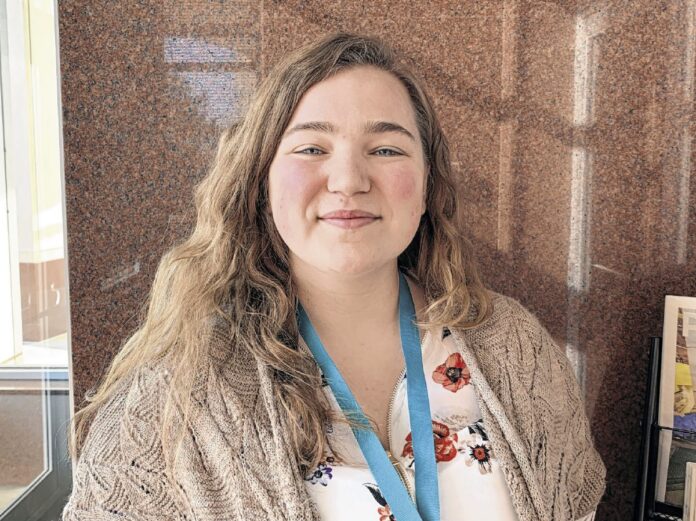GREENFIELD — Domestic violence is often seen as an adult topic, something most likely to occur between people who are married or living together. But relationship violence can happen between young people too, as a recent program sought to highlight.
The “In Their Shoes” program, put on by domestic violence advocacy organization Alternatives Inc., aimed to educate teenagers on the ways dating violence occurs and how they can seek help for themselves or someone they know.
Teens at the event, held Friday at the Hancock County Public Library, followed a “Choose Your Own Adventure”-style journey through the life of a character facing intimate partner abuse at a young age. Scenarios included examples of different negative behaviors, including physical violence, emotional abuse and stalking.
After selecting a card representing one of the relationship scenarios, participants followed prompts on the cards representing different responses to conflict in the relationships and explored possible avenues of seeking help like friends, family and law enforcement, receiving both support and rejection along the way.
Madison Garrity, the Alternatives victim advocate for Hancock County, said the activity was designed to represent many types of victims.
“Because male violence can happen to anyone of any age and any gender, we have male victims as well,” Garrity said.
After the activity was completed, facilitators revealed to the participants that each character was based on the real-life experience of a young victim, including one whose story ended with her murder.
“Statistics show that teen dating violence is becoming increasingly common. We see that actually, domestic violence in general affects typically people between the ages of 16 and 24,” Garrity said. “What we want to do is spread awareness that it does happen and if they experience it, they’re not alone — help is available. If a friend is experiencing it, or a family member, there are resources available.”
According to a leading domestic violence prevention organization, Love Is Respect, nearly 1.5 million high school students experience physical violence from a dating partner each year. One in three girls in the United States experiences some form of abuse in a relationship, whether it’s physical, emotional or verbal abuse, making the problem far more widespread than other forms of youth violence like bullying. And only a third of teens who experience dating violence ever tell anyone about the abuse.
Garrity said teens can look for signs that their friends might be experiencing dating violence, such as changes in personality, withdrawing from friends or covering up physical injuries.
“It’s important that we’re not just bystanders, but we’re upstanders. We stand up and do something to help a person who needs it,” Garrity said.
Debriefing after the exercise, participants talked about the characters they followed and their experiences with things like teen pregnancy and relationships with large age gaps.
Hailey Hart followed the scenario of a young girl facing sexual pressure from her boyfriend. She learned about the importance of standing up for yourself.
“If someone’s trying to get me to do something, I won’t do it,” Hailey said.
Garrity said people who have not experienced domestic violence themselves may have trouble understanding the tough choices a victim faces, in particular about whether to stay in the relationship.
“If you’re experiencing it, help is out there. There are victim advocates in each county that are there to assist. There’s law enforcement, other legal advocates and legal help available. There’s counseling services available. There’s all kinds of stuff that you can be connected to if you’re going through this.”
Knowing what resources are available, Garrity said, is also important if a friend or family member is facing domestic abuse — but in that case, the most important thing can be to provide a support system even if the victim is not ready to exit the relationship.
“The first thing is knowing that it’s hard to get out, and just being patient if someone’s not ready to get out yet is going to be number one, I would say,” Garrity said.
[sc:pullout-title pullout-title=”Pull Quote” ][sc:pullout-text-begin]
“Statistics show that teen dating violence is becoming increasingly common… What we want to do is spread awareness that it does happen and if they experience it, they’re not alone — help is available…”
–Madison Garrity
Hancock County victim advocate, Alternatives Inc.
[sc:pullout-text-end]

